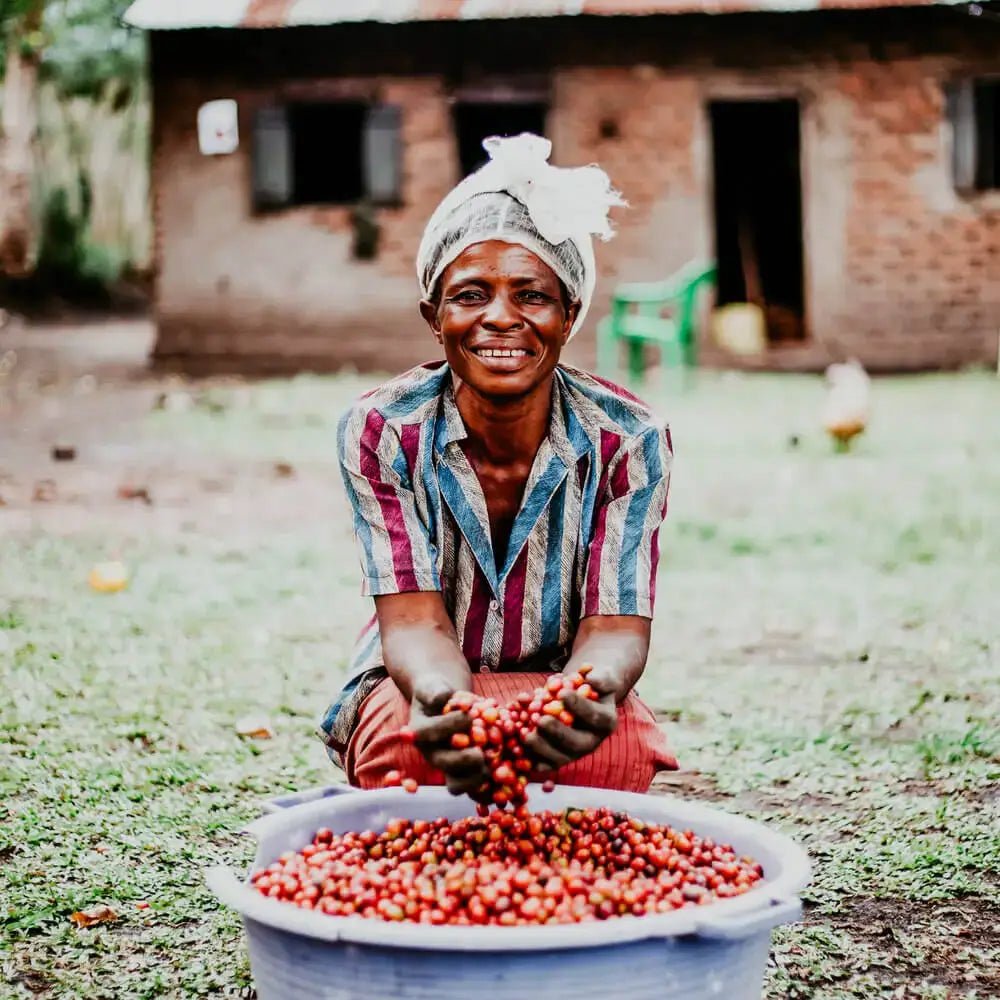
Why African Coffee Is Highly Rated?
James RocheWhy African Coffee Is Highly Rated - A Journey Through Flavor and Culture
Introduction:
African coffee is more than just a caffeinated beverage; it's a journey through rich flavours and deep-rooted cultural traditions. In the world of coffee, African beans stand out for their unique profiles, captivating the taste buds of coffee lovers worldwide. But what is it that makes African coffee highly rated and sought after? Let's embark on a flavourful journey across the African Coffee Belt to discover the secrets behind the allure of African coffee.
-
The African Coffee Belt:
Nestled between the Tropics of Cancer and Capricorn, the African Coffee Belt stretches across the equator, encompassing countries like Ethiopia, Kenya, Uganda, and Tanzania. This geographical region boasts the ideal conditions for coffee cultivation. High altitudes, volcanic soils, and a temperate climate create the perfect recipe for growing exceptional coffee beans.
-
Rich Coffee History and Tradition:
The history of coffee in Africa dates back centuries, long before it gained global popularity. Ethiopian legends tell stories of a goat herder named Kaldi, who noticed the energising effects of coffee cherries on his flock. This discovery led to the birth of coffee culture in the region. Coffee ceremonies, a traditional practice in many African communities, involve roasting, grinding, and brewing beans in a ceremonial manner, showcasing the deep cultural connection to coffee.
-
Unique Coffee Varietals:
African coffee is renowned for its diversity of coffee varietals, each offering a distinct and captivating flavour profile. In Ethiopia, the birthplace of coffee, you'll encounter varieties such as Yirgacheffe, Sidamo, and Harrar, known for their floral, fruity, and earthy notes, respectively. Kenya, on the other hand, produces the celebrated AA-grade beans, celebrated for their bright acidity and citrus-like flavours. In Uganda, the Bugisu beans deliver a rich, full-bodied cup with hints of cocoa. These unique varieties are a testament to Africa's rich coffee heritage, ensuring that every cup is a sensorial adventure.
-
The Impact of Terroir:
When discussing African coffee, one cannot overlook the concept of terroir, a French term that encapsulates the environmental factors contributing to a coffee's flavour. African coffee's exceptional quality owes much to the region's diverse terroirs. The fertile volcanic soils of the Rift Valley in Ethiopia impart a natural sweetness to coffee beans, while the high altitudes of Kenyan coffee farms result in a bright acidity and lively character. The impact of terroir is profound, giving African coffee a complexity that distinguishes it from coffee produced in other parts of the world.
-
Natural Processing Methods:
One of the hallmarks of African coffee is its natural processing methods. While other regions often employ washed or semi-washed techniques, African coffee is frequently sun-dried with the coffee cherries intact. This process allows the bean to absorb flavours from the fruit, resulting in a distinct fruity and floral aroma. Natural processing adds a layer of complexity to the flavour, with tasting notes ranging from berry and citrus to jasmine and honey. It's a method deeply intertwined with tradition and the unique character of African coffee.
-
The Role of Sustainability:
African coffee farmers are increasingly embracing sustainable practices, which further enhance the reputation of their coffee. Initiatives like fair trade, organic farming, and shade-grown coffee are gaining traction in African coffee-growing regions. These practices not only benefit the environment but also ensure the well-being of the local communities. By supporting sustainable African coffee, consumers not only enjoy exceptional coffee but also contribute to the preservation of these unique coffee regions for future generations to enjoy.
-
The Global Appeal:
African coffee's allure isn't confined to its continent of origin. It has a global fan base that spans across borders. Coffee enthusiasts worldwide are drawn to the rich and diverse flavours that African coffee offers. Reviews and testimonials from coffee lovers often emphasise the vibrant acidity, fruity undertones, and unique profiles of African beans. The global demand for African coffee has also elevated its status in the specialty coffee industry, where connoisseurs seek out the finest African single-origin beans for their extraordinary taste.
To truly appreciate the exceptional flavours of African coffee, it's essential to brew it properly. Whether you prefer a pour-over, French press, or espresso, there are a few key tips to keep in mind. Use fresh, high-quality beans, grind them just before brewing, and pay attention to water temperature. African coffee's distinct characteristics shine when brewed to perfection. Experiment with different brewing methods and equipment to discover your favourite way to enjoy this extraordinary coffee.
-
Supporting African Coffee Growers:
As you delve into the world of African coffee, consider ways to support the dedicated farmers and businesses behind these exceptional beans. Many farmers offer direct sales, allowing you to purchase coffee directly from the source. Look for fair trade certifications, which ensure that farmers receive a fair price for their hard work. By supporting African coffee growers, you not only savour top-quality coffee but also contribute to the livelihoods and sustainability of the communities that cultivate these unique beans.
African countries and their coffee beans
Rwandan coffee
Rwandan coffee, emerging as a rising star in the world of specialty coffee, is a testament to the country's commitment to quality and sustainability. Nestled in the heart of East Africa, Rwanda's coffee-growing regions, such as the celebrated areas of Gakenke and Nyamasheke, offer the ideal combination of altitude and volcanic soil. The result is coffee beans renowned for their bright acidity, medium body, and strikingly complex flavour profiles, often infused with floral and fruity notes. What sets Rwandan coffee apart is not just its captivating taste but also the dedication to ethical and sustainable farming practices. Many Rwandan coffee growers prioritise social and environmental responsibility, emphasising fair trade and organic cultivation. With every sip of Rwandan coffee, you not only savour a delightful and unique flavour but also support a nation's journey toward economic prosperity and environmentally conscious coffee production.
Kenyan coffee
Kenyan coffee is a captivating journey for the senses, celebrated for its vibrant and distinct flavour profile. Situated in the high-altitude plateaus of East Africa, Kenya's coffee-growing regions, including Nyeri, Kirinyaga, and Murang'a, benefit from volcanic soil and a temperate climate. Kenyan coffee is renowned for its bright acidity, medium body, and an array of flavours that often include citrus, black currant, and floral notes. The "AA" grade beans, an indicator of size and quality, are prized for their outstanding quality. What sets Kenyan coffee apart is its meticulous processing, with a method known as the double fermentation process, which enhances its unique taste. Kenyan coffee cherishes tradition, and coffee plays a central role in Kenyan culture, from daily rituals to local gatherings. Sipping Kenyan coffee is not just about the taste; it's a window into the nation's history and its commitment to excellence in coffee production, making it a favourite among coffee enthusiasts worldwide.
Zimbabwean coffee
Zimbabwean coffee, often overlooked but steadily making a name for itself, offers a delightful and unique coffee experience. Nestled in the Eastern Highlands region of Southern Africa, Zimbabwe's coffee farms benefit from high altitudes and a temperate climate, perfect for the cultivation of arabica beans. Zimbabwean coffee is celebrated for its rich, medium-bodied character, with tasting notes that often include bright acidity and a combination of fruity and nutty flavours. Coffee production in Zimbabwe, while smaller in scale compared to some other African countries, emphasises quality over quantity. The commitment to traditional and sustainable farming practices, as well as an increasing focus on organic cultivation, ensures that Zimbabwean coffee continues to improve in both flavour and reputation. With each cup of Zimbabwean coffee, you not only savour a distinctive and delicious brew but also support the revival of a nation's coffee industry, making it a worthwhile discovery for coffee connoisseurs.
Burundian coffee
Burundi coffee, situated in the heart of East Africa, is a testament to the country's dedication to producing exceptional coffee. Nestled in regions blessed with high altitudes, volcanic soil, and a temperate climate, Burundi offers an ideal environment for cultivating coffee. The coffee from Burundi is known for its bright acidity, medium body, and a delightful combination of fruity and floral notes. The meticulous care taken in growing, harvesting, and processing the beans is reflected in every cup. What distinguishes Burundi coffee is not only its flavour but also its commitment to sustainable practices and fair trade, supporting the livelihoods of local coffee farmers. With each sip of Burundi coffee, one not only enjoys a rich and vibrant taste but also contributes to the growth and prosperity of this unique coffee origin.
Ugandan coffee
Ugandan coffee, cultivated in the heart of a region blessed with diverse altitudes and microclimates, offers a distinct and remarkable coffee experience. With regions benefiting from diverse altitudes and microclimates, Uganda's coffee presents a rich medium body, often celebrated for its bright acidity and a combination of fruity and nutty flavours. The "Pearl of Africa" is steadily gaining recognition for its specialty coffee, marked by its floral and fruity notes. However, what truly sets Ugandan coffee apart is the country's growing embrace of sustainable practices and ethical sourcing. Many Ugandan coffee farms prioritise organic and shade-grown cultivation, ensuring not only the highest quality beans but also environmental preservation. With every cup of Ugandan coffee, you embark on a journey of discovery, savouring a distinctive and unforgettable taste that's a testament to the country's coffee heritage.
Ethiopian coffee
Ethiopian coffee, often regarded as the birthplace of coffee itself, is a mesmerising journey through history, culture, and extraordinary flavours. Ethiopia's diverse landscapes, ranging from high-altitude plateaus to lush forests, create an ideal environment for coffee cultivation. Ethiopian coffee is celebrated for its wide range of unique and distinct flavour profiles, from the bright and floral notes of Yirgacheffe to the bold, wine-like characteristics of Harrar beans. What sets Ethiopian coffee apart is its deeply ingrained cultural significance, with coffee ceremonies being a tradition that brings communities together. This rich coffee heritage is evident in every sip, which offers a taste of the past, present, and future of coffee. Ethiopian coffee represents a remarkable fusion of tradition and flavour, making it a beloved choice for coffee enthusiasts worldwide.
Ivory Coast
Ivory Coast, a West African nation known for its cocoa production, is also gaining recognition in the world of coffee. While cocoa remains a primary export, coffee cultivation is making strides, particularly in regions like Daloa and Man. Ivorian coffee often consists of robusta beans, appreciated for their bold, full-bodied flavour and earthy notes. The country's coffee industry is gradually embracing improved farming practices and quality standards, contributing to the emergence of specialty Ivorian coffee. What distinguishes Ivory Coast coffee is its unique position in West Africa's coffee scene, offering an alternative to the more renowned East African coffee regions. With the potential for growth and increasing interest in specialty coffee, Ivory Coast presents an exciting opportunity for coffee enthusiasts to explore and appreciate the evolving flavours of this West African nation.
Malawi coffee
Malawi, situated in the heart of southeastern Africa, is gaining recognition for its coffee production. Known for both arabica and robusta coffee beans, Malawi offers a unique coffee experience. Malawian coffee often presents a medium body, with a flavour profile that combines fruity and nutty notes. What distinguishes Malawi coffee is the country's growing emphasis on quality and sustainability. Many coffee farmers in Malawi have adopted improved farming practices, focusing on organic cultivation and ethical sourcing. With the goal of enhancing the livelihoods of local communities and preserving the environment, Malawi's coffee industry is evolving to provide a flavourful and sustainable coffee experience. With each cup of Malawi coffee, you not only enjoy the distinct taste but also contribute to the growth of a nation's coffee heritage and the well-being of its coffee farming communities.
Libyan coffee
Libya, a country that typically conjures images of vast deserts and ancient history, is also home to a lesser-known treasure: Arabica coffee. In certain regions of Libya, Arabica coffee beans are cultivated, offering a unique and unexpected coffee experience. Libyan Arabica coffee often boasts a light to medium body, with a flavour profile that leans towards the brighter and more floral side, occasionally accentuated by hints of citrus. The cultivation of Arabica coffee in Libya is a testament to the country's adaptability to diverse crops, despite its arid landscapes. While Libyan coffee may not yet have the international recognition of other coffee-producing nations, it provides an exciting opportunity for coffee enthusiasts to explore the unique and evolving flavours of this North African region, where coffee and tradition converge in unexpected ways.
Try our African Moon Ugandan coffee
dark chocolate, cherry, toasted nuts



